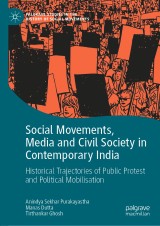Details

Social Movements, Media and Civil Society in Contemporary India
Historical Trajectories of Public Protest and Political MobilisationPalgrave Studies in the History of Social Movements
|
117,69 € |
|
| Verlag: | Palgrave Macmillan |
| Format: | |
| Veröffentl.: | 09.08.2022 |
| ISBN/EAN: | 9783030940409 |
| Sprache: | englisch |
| Anzahl Seiten: | 237 |
Dieses eBook enthält ein Wasserzeichen.
Beschreibungen
This book examines instances of transformative dissent, turning points or shifts in popular mobilisation patterns in contemporary India, while adopting a historical approach and analysing past events. Exploring the different continuities and discontinuities in mobilising patterns and dissident agency in India, the authors present a heterogeneous insurrectional pattern that pivoted around issues of caste, class, religion, land reform, labour, taxation and territorial control, with anti-colonialism movements becoming prominent in the first half of the twentieth century. The authors move beyond this to explore more recent templates of mobilisation which surfaced towards the end of the twentieth century, during India’s liberalisation period. With growing marketisation and technological advancement, unprecedented changes in social relations, growing economic opportunities and cultural transfusion taking place, the country became a ‘New India’ - one which aspired to be a global player in the wider technological public sphere. Tracing the historical trajectories of social movements in India, this book examines recent trends in digitised dissidence and explores new frontiers of protests, providing fresh insights for those researching the history of social movements, South Asian and Indian history and postcolonial studies.
<p>1.Introduction:Past Dissidence and Contemporary Cyber-Publics: Popular Protests in India.- 2. Historicising Social Conflicts, its Major Strands: Ancient, Colonial and Early Postcolonial India.- 3. Second Democratic Upsurge, Liberalisation and New India: Post-1970s` Socio-political Mobilisations.- 4. Semiology and Simulacrum: Post-1990s` Virtual Transformation of Popular Dissent.- 5. New Grammar of Protests in Contemporary India: Few Case Studies & Conclusion.</p>
<p>Anindya Sekhar Purakayastha is Professor in the Department of English and Coordinator in the Centre for Critical Social Inquiry at Kazi Nazrul University in India. Previously, he was a Fulbright Fellow at the University of Massachusetts, Amherst, in the USA. He works on postcolonial violence and literary cultural responses. He co-edits <i>Kairos</i>, the journal of the Postcolonial Studies Association of the Global South. </p><p>Manas Dutta is Assistant Professor in the Department of History at Aliah University in India, and his current area of research covers issues related to war and conflict in South Asia, with a special focus on civil-military relations in the Global South. In 2018, Manas was a Fellow in the Institute of Critical Social Inquiry at the New School for Social Research, USA. </p><p>Tirthankar Ghosh is Assistant Professor in the Department of History at Kazi Nazrul University in India. His areas of specialisation are the social history of disaster, the ecological and environmental history of India, the economic history of India and social and political movements in colonial and post-colonial India<br></p>
This book examines instances of transformative dissent, turning points or shifts in popular mobilisation patterns in contemporary India, while adopting a historical approach and analysing past events. Exploring the different continuities and discontinuities in mobilising patterns and dissident agency in India, the authors present a heterogeneous insurrectional pattern that pivoted around issues of caste, class, religion, land reform, labour, taxation and territorial control, with anti-colonialism movements becoming prominent in the first half of the twentieth century. The authors move beyond this to explore more recent templates of mobilisation which surfaced towards the end of the twentieth century, during India’s liberalisation period. With growing marketisation and technological advancement, unprecedented changes in social relations, growing economic opportunities and cultural transfusion taking place, the country became a ‘New India’ - one which aspired to be a global player in the wider technological public sphere. Tracing the historical trajectories of social movements in India, this book examines recent trends in digitised dissidence and explores new frontiers of protests, providing fresh insights for those researching the history of social movements, South Asian and Indian history and postcolonial studies. <div><br></div><div><p>Anindya Sekhar Purakayastha is Professor in the Department of English and Coordinator in the Centre for Critical Social Inquiry at Kazi Nazrul University in India. Previously, he was a Fulbright Fellow at the University of Massachusetts, Amherst, in the USA. He works on postcolonial violence and literary cultural responses. He co-edits <i>Kairos</i>, the journal of the Postcolonial Studies Association of the Global South. </p><p>Manas Dutta is Assistant Professor in the Department of History at Aliah University in India, and his current area of research covers issues related to war and conflict in South Asia, with a special focus on civil-military relations in the Global South. In 2018, Manas was a Fellow in the Institute of Critical Social Inquiry at the New School for Social Research, USA. </p><p>Tirthankar Ghosh is Assistant Professor in the Department of History at Kazi Nazrul University in India. His areas of specialisation are the social history of disaster, the ecological and environmental history of India, the economic history of India and social and political movements in colonial and post-colonial India</p></div>
Combines the study of contemporary trends with historical legacies of social movements in India Caters to the emerging field of humanities by exploring social and audio-visual media as tools social protest Offers fresh insights on public sphere studies and post-colonialism in India

















